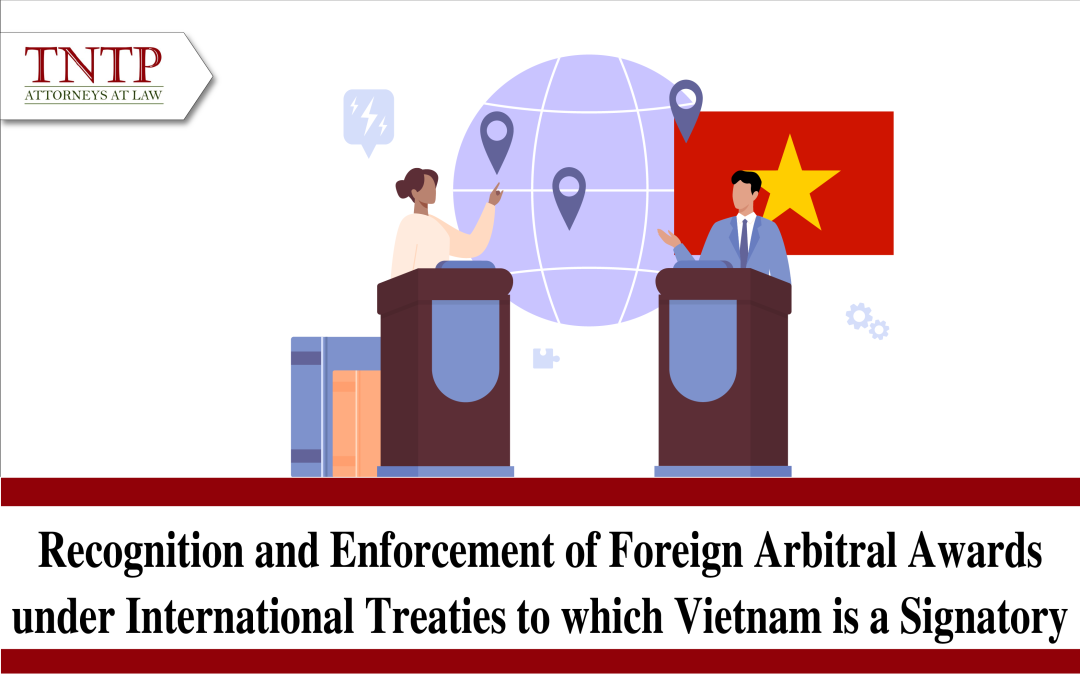The recognition and enforcement of foreign arbitral awards are codified in several international treaties, with the most prominent and foundational legal basis being the 1958 New York Convention on the Recognition and Enforcement of Foreign Arbitral Awards. On July 28, 1995, the President of Vietnam signed Decision No. 453/CTN on Vietnam’s accession to the 1958 New York Convention. This article outlines key aspects of the 1958 New York Convention.
1. Definition
The recognition and enforcement of a foreign arbitral award can be understood as a judicial procedure conducted by a court to examine and recognise the validity of a foreign arbitral award within the territory of Vietnam. The process is initiated upon the request of at least one of the parties involved in the dispute resolution process.
2. The 1958 New York Convention
(i) Statute of limitations for requests for recognition and enforcement of foreign arbitral awards
The Convention does not stipulate a statute of limitations for a party to request the recognition and enforcement of a foreign arbitral award. Therefore, this matter is governed by national law.
(ii) Grounds for refusal to recognize and enforce foreign arbitral awards in certain member states
According to Article 5 of the Convention, grounds for refusal include:
– The parties to the arbitration agreement were under some incapacity or the agreement is not valid under the applicable law. If there is no applicable law specified, the law of the country where the award was issued will apply.
– If the party against whom the award is to be enforced was not properly notified of the arbitrator’s appointment or the arbitration proceedings, or for another reason was unable to present their case.
– The award was issued regarding a dispute not requested for resolution by the parties or beyond the scope of the parties’ requests. However, if the portion of the award addressing the requested matters can be separated from the portion that exceeds the scope of the requests, the part concerning the requested matters may be recognised and enforced.
– The composition of the arbitral tribunal or the arbitral procedure was not in accordance with the agreement of the parties or the law of the country where the arbitration took place.
– The award has not yet become binding on the parties, nor it has been set aside or suspended by a competent authority in the country where the award was issued.
Recognition and enforcement of a foreign arbitral award may also be refused if the competent authority in the requested country finds that the subject matter of the dispute is not capable of settlement by arbitration under the law of that country or that recognition and enforcement would be contrary to the public policy of that country.
(iii) Submission of documents by the requesting party
The 1958 New York Convention stipulates that the process of recognition and enforcement is subject to national laws. In Vietnam, the competent court to consider requests for recognition and enforcement of foreign arbitral awards is the provincial People’s Court where the individual against whom enforcement is sought resides or works, or where the organization required to enforce the award is headquartered or has assets related to the enforcement of the foreign arbitral award.
According to Article 4 of the Convention, the party seeking recognition and enforcement must submit a request, accompanied by the original or a certified copy of the arbitral award and the arbitration agreement. If the award is not rendered in the official language of the country of the requested court, the court may require the requesting party to submit a certified translation by an official interpreter or by a diplomatic or consular authority.
(iv) Burden of proof
There are three principles governing the burden of proof:
– The principle of the claimant bearing the burden of proof: Under this principle, the party initiating the legal action or making the request must present evidence.
– The principle of reciprocity: According to this principle, the burden of proof is not solely on the claimant, but also on the respondent, who must present counter-arguments or defences against the claims.
– The principle of determining the burden of proof: According to this principle, the determination of the parties’ burden of proof is based on the judgments and assessments of the adjudicating authority, regardless of whether the parties make any requests.
This article aims to provide readers with a detailed overview of “Recognition and Enforcement of Foreign Arbitral Awards under International Treaties to which Vietnam is a Signatory”. If there are any issues requiring further discussion, please contact TNTP for timely support.
Sincerely,







